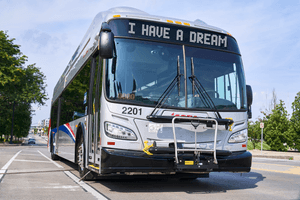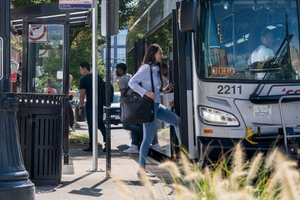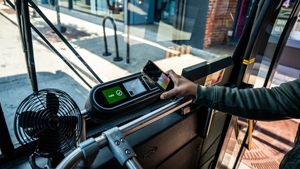FTA Awards COTA with $22.8 Million Federal Grant for Initial Investment in New Clean Hydrogen Fuel Cell Electric Buses
The Central Ohio Transit Authority (COTA) announced it received a $22.8 million grant award from the U.S. Department of Transportation’s Federal Transit Administration (FTA) that for the first time will fund 10 new hydrogen fuel cell electric buses (FCEBs) to COTA and the region. The award will also support the construction of a new hydrogen fueling station at the McKinley Avenue facility, and help fund an additional 10 electric buses, all of which will help COTA achieve its goals to transition to a zero-emission bus fleet by 2035 and achieve net-zero carbon neutrality by 2045.
FTA Acting Administrator Veronica Vanterpool announced the award today during a check presentation at COTA’s McKinley Avenue transit facility, alongside COTA President/CEO Monica Tellez-Fowler, Columbus Mayor Andrew Ginther, Columbus City Councilmember Lourdes Barroso de Padilla, MORPC Executive Director William Murdock, and other COTA and local officials. The funding comes from the FTA’s Low or No Emissions Grant Program to help COTA and other transit agencies across the country buy or lease U.S.-built low-or-no-emission vehicles, including related equipment or facilities.
“Thanks to the Bipartisan Infrastructure Law, we are creating new opportunities to improve the lives of millions of Americans who rely daily on buses,” Vanterpool said. “These grants will help deliver cleaner and greener transportation, designed to reach everyone, and to work for everyone, particularly in places that haven’t received enough resources in the past.”
“We are grateful for this award from the FTA and its support of sustainable transit initiatives. This is a victory for our neighborhoods, directly impacting air quality and quality of life in the region while helping COTA support vibrant, healthy neighborhoods for everyone,” said Tellez-Fowler. “Investing in hydrogen fuel cell technology and infrastructure will allow COTA to reach our goal of zero-emissions while providing sustainable, accessible service as we prepare to expand our transit system to accommodate tremendous growth that is expected in the next 25 years.”
FCEBs are zero-emissions vehicles that use hydrogen gas to create electricity to charge a stack of batteries that powers the bus’s electric motor. With a range of roughly 300 miles – similar to COTA’s current compressed natural gas fleet – and an ability to be refueled in 10 minutes or less, these new buses are a promising option for expanding COTA’s zero-emissions fleet and can cover any current COTA route.
In addition to alignment with the City of Columbus Climate Action Plan, a fleet that includes both battery electric buses and FCEB vehicles continues momentum in meeting the goals of LinkUS, COTA’s comprehensive transportation plan to create a more equitable and sustainable region for all. Approximately 65% of the region’s greenhouse gas emissions come from passenger vehicles, and increasing the use and availability of zero-emissions transit vehicles will be critical to reducing those emissions.
COTA plans to purchase only zero-emission vehicles for its fixed-route service moving forward and expects as many as 12 FCEBs to be operating by 2026. A recent COTA Fleet Transition analysis found that in the long term, a third of COTA’s total fleet could be comprised of FCEBs. COTA is on track to meet its goal of a zero-emissions fleet of 300 buses by 2035, with the authority’s final 22 diesel coaches in operation to be retired by the end of this year. In 2021 COTA put its first two electric buses in service and already has 24 electric buses in operation with an additional 26 electric buses expected to be in service by the end of 2024. The 20 buses funded by the new FTA Low or No Grant will replace 20 existing COTA CNG buses



